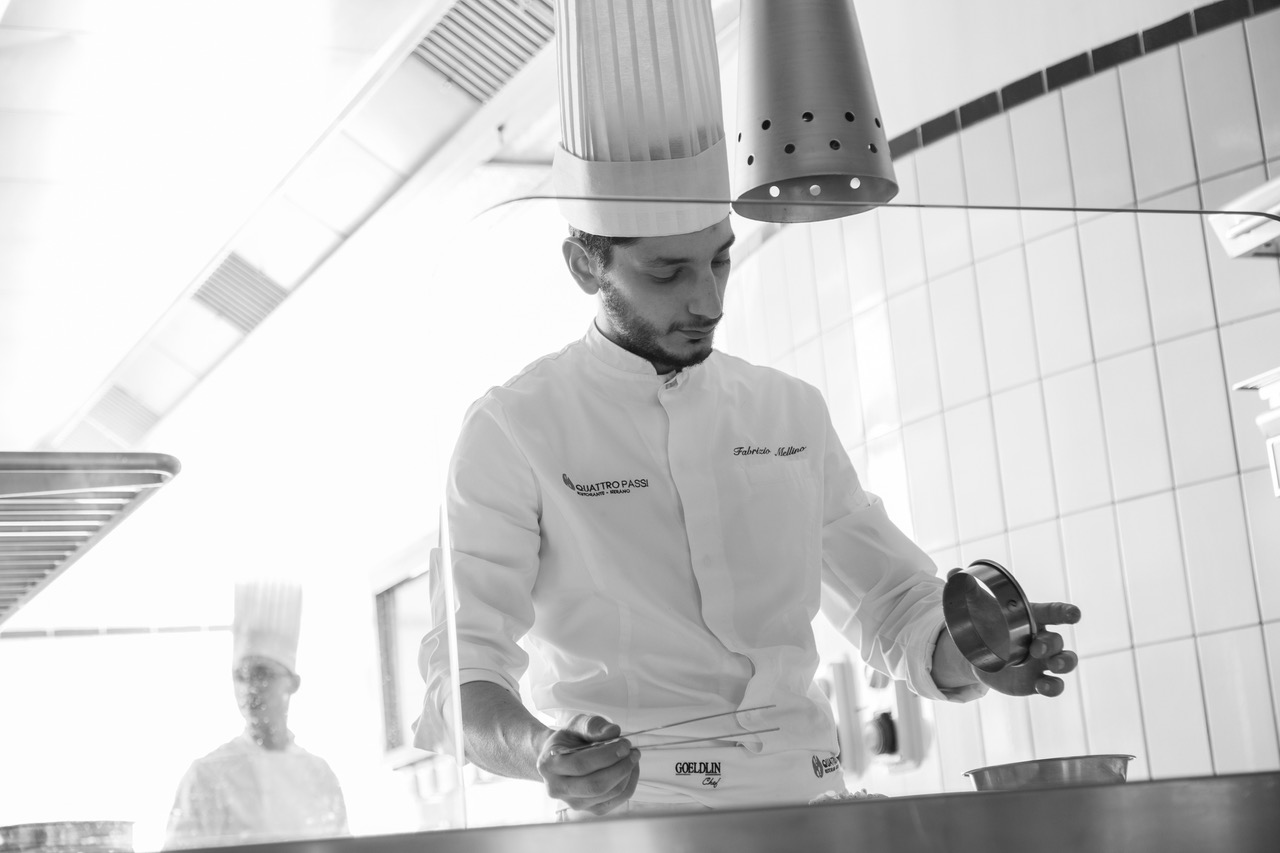Tell us briefly about your story and your current work:
I am currently the chef of the family restaurant Quattro Passi. Born and raised in Campania and even more specifically on the coast, I approached the world of cooking thanks to my parents. After my high school studies in Italy, I embarked on my travels around the world (France, Spain, Japan), and then in 2018 I started at Quattro Passi, already awarded two stars, bringing my cooking philosophy and reaching Michelin’s highest recognition last year.
Can you tell us more about your cooking philosophy?
My cooking philosophy was born around the Mediterranean. I grew up with certain ingredients, and when I had the opportunity, I wanted to highlight them in my dishes, providing a clear and precise picture of what Campania means.
I am very attached to extra virgin olive oil, almost viscerally. In my dishes, you often find different varieties that allow me to enhance the ingredients. I don’t use it as a condiment but as an ingredient. Every year, together with my producer, we taste the oils and, based on their characteristics, acidity, aromas, and polyphenols, we pair them with specific dishes.
I grew up when restaurants had oil carts, with the idea that oil could be paired with fish or meat. Reflecting on this, I considered it a mistake. Can a customer be capable of choosing an oil? Can an oil be simply strong or mild?
Clearly, my cooking thrives on seafood and vegetables. Over time, I have realized that both have a seasonality or micro-seasonality. For vegetables, it’s more obvious; for seafood, not everyone knows it exists. Growing up and then talking to fishermen, I became convinced that I had a responsibility. I don’t consider sea bass more noble than cod, especially if the latter was caught a few hours ago and the former comes from some farm in Greece or Spain. It is up to us chefs to maximize the value of the available raw materials, always trying to put the best available on our tables, highlighting small fishermen or producers. Those who travel kilometers to reach us in our restaurants come to savor the identity of the place. I find it absurd that salmon or Wagyu is sold on the tables of the coast.
My journey started in France, first in Lyon and then Monaco, followed by Spain, and finally Japan. The main goal for me was to see the different interpretations of seafood cuisines around the world.
Why did you choose to stay in Italy?
“Italy called”, I didn’t choose to want to return but I knew, beyond my parents’ company, that my place was here.
What are your predictions for the future of the restaurant / food industry?
There is a lot of talk about sustainability, organic, zero km. The new generations should be made aware of these issues before proposing changes. I grew up with elementary school teachers who made us aware of the ozone hole, and I was about 10 years old. About 25 years have passed since then. What has changed? Nothing.
If we do not work well with the new generation and raise their awareness of healthy eating, explain that there are seasons, and instruct them in purchasing the right quantities, we will end up with an industry that will always find more advantageous production methods, transforming any food to be better for the system, with a massive production of raw materials and a considerable production of CO2 and an increase in cardiovascular diseases and tumors–let alone the temperatures.
Catering, as already happens in France, will be for an elite of people who can afford it. For the new generation with an average expense of €15-20, there will be no choice other than fast food. Home cooking has almost disappeared in the big cities. The chef will be a figure who will grow in importance in modern society because he will preserve ancestral savoir-faire; he will represent a country and culinary traditions that have been handed down for generations.
What are the biggest obstacles you face and the greatest satisfactions you get from working in this country?
There are no obstacles for those who have clear ideas and the desire to continually get involved. Every country has its pros and cons: Italy is certainly not perfect, let alone the south. We know that we are an elderly country run by elderly people–most likely corrupt and living on nepotism.
An American manager says “the boy is good and also young.” In Italy, however, a manager will say “the boy is good but young.” You see, for us, [age] is a limit.
But Italy is also an extraordinary country with incredible products, the sun, and the sea. A unique biodiversity among the Mediterranean regions. We are envied by the whole world for our creativity, the lightness with which we face life, our history. Everything we do is beautiful because we are surrounded by beauty.
Now we need to be realistic. We will no longer talk about Italy alone, but in the context of Europe–facing China, India, or the USA, there is no comparison. For me, the future will be a capitalist Germany that will finance a French marketing that will sponsor the art of Made in Italy.
